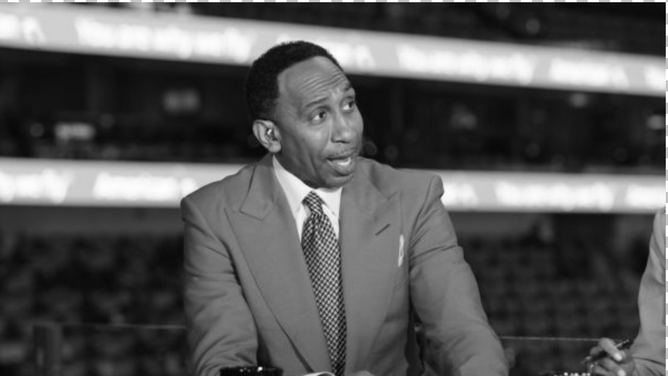ESPN/Disney Is Likely to Overpay For Stephen A. Smith | Bobby Burack
ESPN recently offered host Stephen A. Smith a new contract worth $90 million over five years, at $18 million per year. Smith wants more, to the tune of around $25 million per year.
Puck News first reported the figures of ESPN's initial offer to Smith's agents at WME.
Smith has been vocal on his independently-owned podcast that he believes he deserves more money than Pat McAfee, Joe Buck, and Troy Aikman – the three current highest-paid talents at the company. At $18 million a year, Smith would earn more than Buck and Aikman but not McAfee.
Smith and his representatives argue he should make more than McAfee because he's a bigger star with a more successful daily talk show. However, Smith and McAfee are not one-to-one comps.
See, McAfee is not signed to the network on a traditional talent contract. ESPN rents "The Pat McAfee Show" from the talent, who retains ownership of the brand. Between the licensing deal and appearances on "College GameDay," Puck News cited sources saying McAfee nets close to $30 million a year.
There's also a compelling argument that Smith is not worth as much to ESPN as Buck or Aikman. While more viewers tune into ESPN for Smith than the NFL commentators, the latter helped Disney secure better Monday Night Football matchups.
Sources tell OutKick that the NFL would not have given ESPN the Chiefs/Eagles Super Bowl rematch or Ravens/49ers Christmas special last year had the network not improved its MNF booth, which plagued the company for years.
As successful as "First Take" is – posting viewership gains for 22 consecutive months – it's just a studio show on cable. Live events are what matters most.
Moreover, Smith is not as irreplaceable as one might think. ESPN recently re-signed Shannon Sharpe to a new multi-year agreement, and sources say the network would look to replace Smith with Sharpe should the former depart.
Would the ad revenue for "First Take" drop $25 million a year if Sharpe replaced Smith? Doubtful.
ESPN also acknowledges that Smith has elevated himself to such a high-salary echelon that he has priced himself out of the budgets for most competing networks. Even cable news networks like CNN do not pay hosts the salary Smith seeks.
Though Smith could migrate his brand entirely to YouTube or social media and own his content, such a decision would require him to give up a substantial level of reach and influence. There's a reason McAfee gave up the independence to sign with ESPN last summer.

Via Getty
On the surface, ESPN could reasonably calculate that its $18 million annual offer to Smith is already generous. However, stories rarely unfold on the surface.
Despite the factors we mention, Smith still holds great leverage over the network. He has the almighty race card firmly in his back pocket.
There is no scenario in which race does not play a role in his contract negotiations. Smith has already cited race several times when discussing the difference between him and McAfee, claiming McAfee benefits from white privilege.
"I love Pat McAfee, love him to death. I love his swag. I love the fact that he’s an honest brother. He don’t give a shit," Smith said in February.
"That works for me. Now, is he as polished politically as me? Nope, because he has no desire to be number one. And number two, if we’re being honest, he’s white, and I’m black; he doesn’t have to be."
Stephen A. is sending ESPN a message. If the network does not meet his demands, the script will form quickly: ESPN doesn't pay Stephen A., a black man, as much as McAfee, a white man.
That is a narrative Disney will do what it can to avoid. Reminder, ESPN offered Maria Taylor around $5 million a year, more than double her market value, in 2020 as it faced similar racially-charged pressure.
ESPN also understands the threat of Smith leaving and emerging as its No. 1 detractor on the outside. Unlike Dan Le Batard or Jemele Hill, two bitter former employees, Smith has the cultural relevance to change the perception of the company, whether his commentaries are honest or not.
Speaking to sources, the most commonly found prediction is that ESPN finds a way to pay Stephen A. what he wants. For example, Disney may invest further into his production company, Mr. SAS Productions, to develop more original content for its streaming services.
In May, ESPN teamed with Smith's company to develop the three-part series "Up For Debate: The Evolution of Sports Media," in which Smith explores the popularity of sports debate, on ESPN+.
ESPN recently started to air clips from Smith's podcast on its YouTube channel, signaling an interest in monetizing his self-owned program.
Finally, there's a chance that ESPN parent company Disney steps in. Smith has said publicly on numerous occasions that he wants to move into late night, at some point.
He reiterated that goal during an interview with Sean Hannity at a digital book signing earlier this year. "I am interested in doing late night," Smith told Hannity. "I would love to be the heir apparent to Jimmy Kimmel. I believe I can do it."
Smith didn't reference Kimmel's name by accident. Kimmel’s contract with ABC, a Disney-owned property, runs through 2026 and has said he plans to step down after that.
"I think this is my final contract," Kimmel told the Los Angeles Times in February.
Sources within ESPN say in Smith's ideal scenario, he would eventually succeed Kimmel while still fronting ESPN's NBA coverage and creating content for ESPN+. At that point, a $25 million salary would be more justifiable.
Stephen A. Smith did not respond to numerous emails for comment from OutKick over the past two weeks.